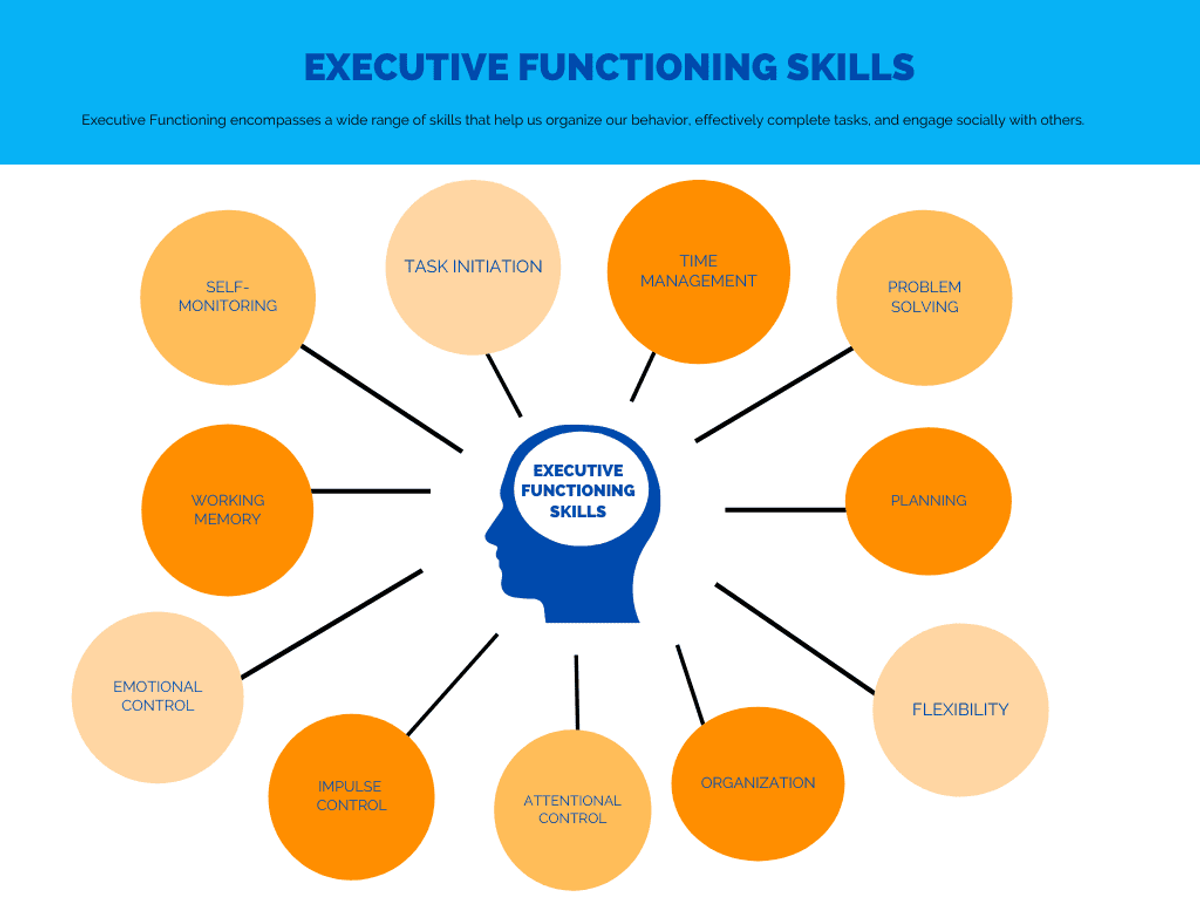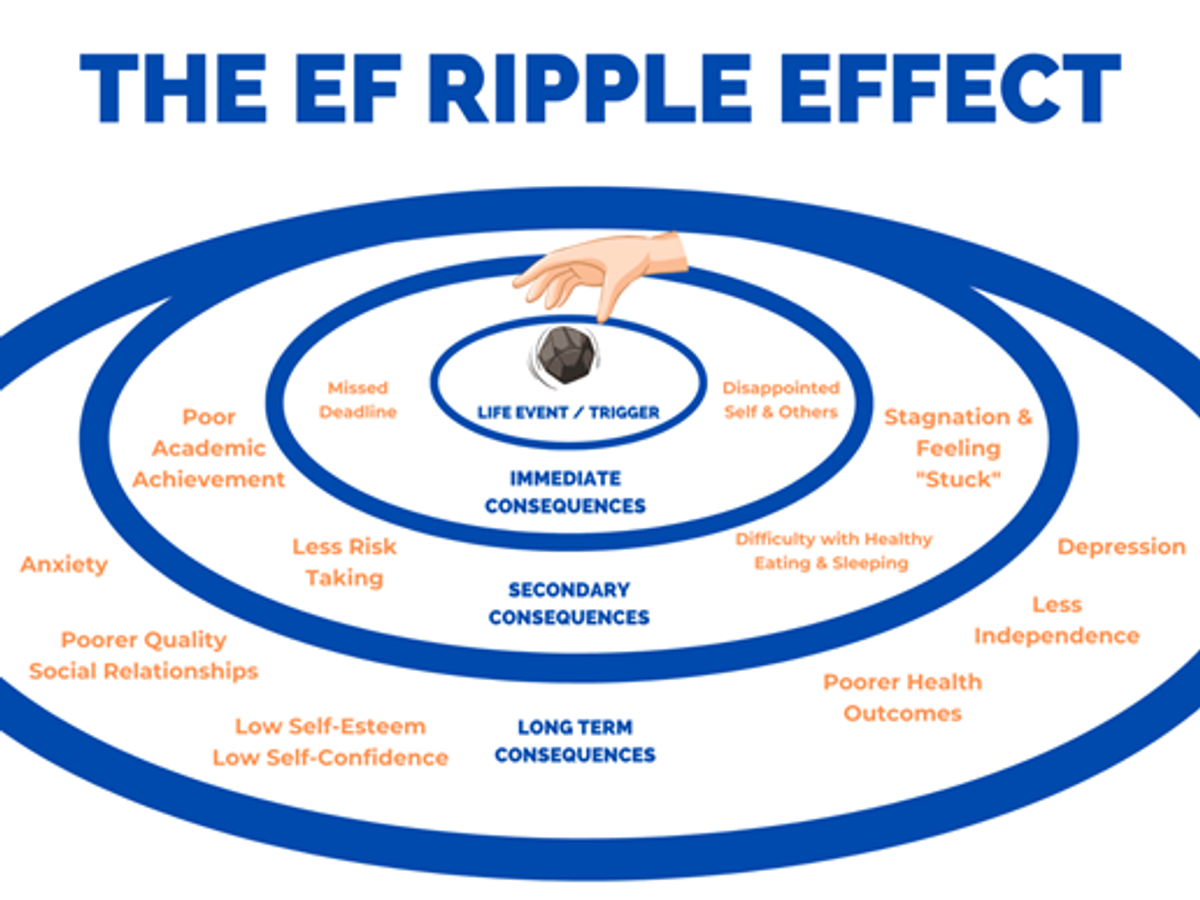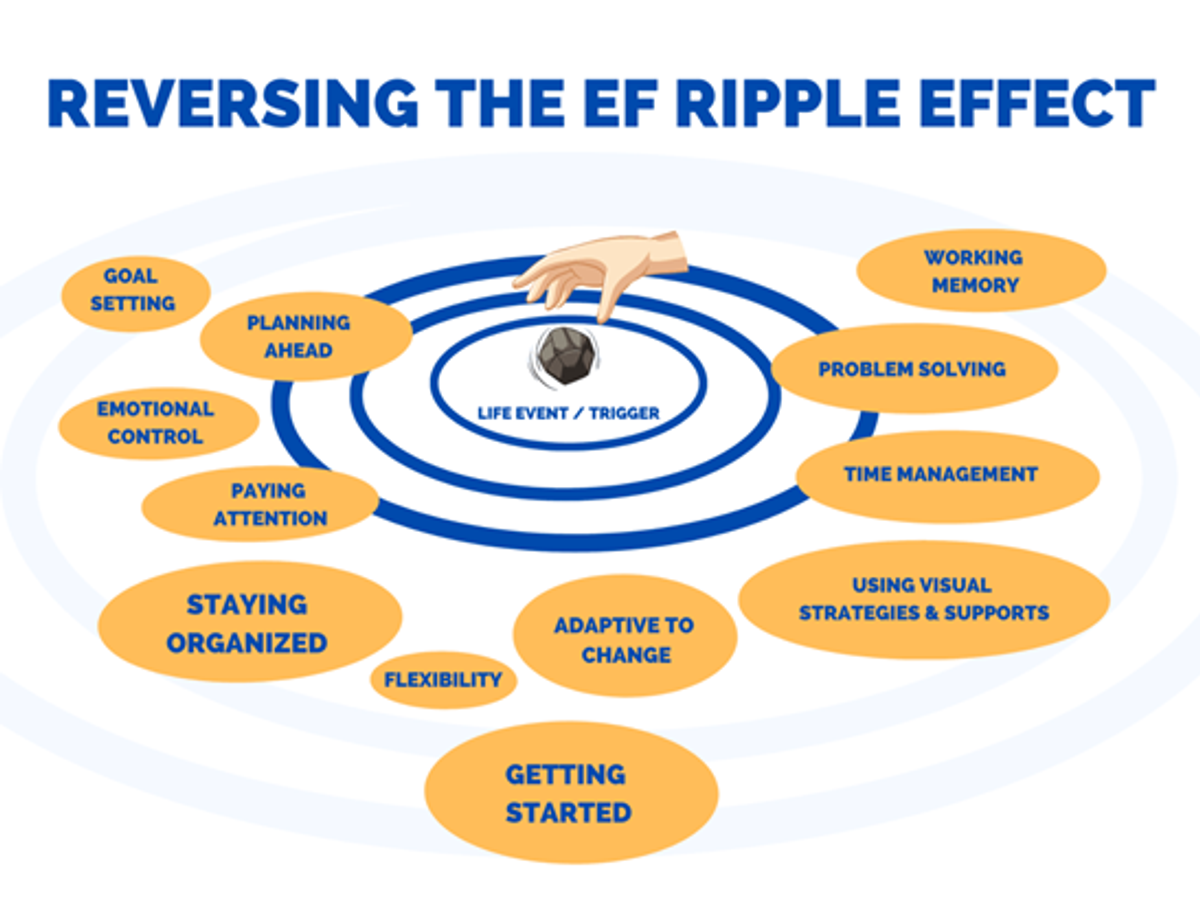WELLBEING
What is the E.F. Ripple Effect?

WELLBEING
What is the E.F. Ripple Effect?
Students can access wellbeing via an online booking form for wellbeing and health related matters.
Student Wellbeing Check In Request Form
Parents/ carers can access supports from Wellbeing for their young person via the Administration Office.


Term Four Week Nine ALREADY! Some students have already started their preparations for the 2024 school year. Year 12 Headstart has finished up and Year 11 Headstart takes place this week. This newsletter we will looks at Executive functioning, the effect it has on our children and what we can do to help. As well as a little look into the Surf Coast Students versions of Women’s Shed held at Torquay Community House.
Executive functioning skills encompass a wide range of behaviours that help govern our actions in the world. For example, executive functioning includes skills like managing our time, being organized, controlling our impulses, breaking down large projects into manageable parts, initiating small tasks, and more. The work we do with our clients gets at the root of what’s causing them to struggle from an executive functioning perspective. This understanding allows us to create a framework that makes learning and generalizing skills like budgeting, studying, meal planning, applying for jobs, etc., much more scalable.


When learners struggle with executive functioning skills, it can cause a cascading impact on other behaviours. EF skills, in many ways, serve as prerequisite behaviours to help our learners accomplish more complex goals. Miss those, and we see learners inevitably struggle. Repeated challenges then lead to decreases in motivation, confidence, and academic performance. Research demonstrates that teens and young adults who struggle in these areas may also experience elevated symptoms of depression and anxiety. What starts as a tiny disruption in the pond can, over time, cause a ripple effect in other areas of learning and achievement.


Consider this example and how quickly things can cascade for a learner:
Cole, a 17-year-old learner, struggles with paying attention, specifically to tasks he doesn’t like to do. After school, he gets distracted by his phone and talking to his siblings, which means that when he sits down to start homework, it’s always late in the evening. By then, Cole is tired, which makes it harder to focus. So he gets frustrated and snaps at his Mum and brothers, which means that Cole now feels guilty on top of everything.
After trying a few more times, he gives up on homework and goes to bed, which means the next day, he turns in his homework partially finished, and his teacher gives him a failing grade. This pattern repeats as Cole gets further and further behind. Eventually, he stops trying to finish homework completely. His parents become frustrated and start to punish Cole by removing more and more of his privileges to see friends and socialize.
Cole now stays up late on his phone and plays video games as the only way he can socialize (and escape from his nagging parents), which impacts his sleep and makes it more challenging to focus. Cole tries a few times to ‘get a fresh start,’ but because he’s so far behind and exhausted most of the time, he always gets stuck in the same spot. This ultimately leads to stagnation, low motivation, and in Cole’s case, symptoms of depression.
Executive functioning skills act like establishing stepping stones in our learner’s pond.
Think again about our image of dropping a stone into the centre of a quiet pond. This time, place a circle of stones around the centre area where the ripples begin. What happens this time?
Sure, some ripples pass through the barrier, and there’s still disruption in the centre. But fewer waves make it all the way to shore. The pond returns to quiet much quicker because the agitation is contained.


That’s what happens when we build EF skills for our learners. Instead of having the ripples spread across the entire pond, your learner has strong time management, organization, and planning skills placed at critical areas like stepping stones. These EF skills act as barriers, slowing down the disruptions and helping to prevent issues with problem behaviour, low motivation, and challenges with mental health. Yes, our learners will still encounter challenges. The unexpected rocks that life brings will still get dropped into the pond. But with a robust set of EF skills in place, there are fewer widespread ripples.
If you suspect that your learner might be struggling with the EF Ripple Effect, there are some simple steps to start working on the EF Skills (see below). It’s helpful to know, though, that learners experience benefits in academic achievement (getting better grades, more manageable and less stressful to complete homework and projects), but there are also social benefits. Learners we work with who can reverse the EF Ripple Effect by building executive functioning skills also experience:
Does the EF ripple effect align with what you experience with your student or child? Not sure where to get started? Here are some tips on how to start boosting your learner’s executive functioning skills:
1 – Learn About Executive Functioning
Understanding the different types of executive functioning skills, how we learn them, and what to expect at every stage of development is the first place to get started.
2 – Identify The Most Significant Areas Of Concern
With so many different skills and behaviours to work on, it can be helpful to identify which areas of executive functioning are the biggest challenges for your learner. Seek out a professional to conduct a skills assessment. Conducting a skills assessment can help evaluate if a tiny boost in each area or a significant overhaul in one area is needed most.
3 – Rework Your Thinking–This Isn’t The Time For Blame Or Shame
Once you and your learner have an idea about the EF areas that need some work, it’s time to start looking forward instead of backward. Placing blame, shaming, or making your learner feel guilty only teaches a child to avoid you as a parent, teacher, or coach. It doesn’t actually teach them new skills.
4 – Set A SMART Goal
Once you have a skill in mind you or your learner would like to work on, using practical goal setting becomes critical. Help your learner create a specific, measurable, attainable, realistic, and time-sensitive goal that’s written to succeed.
5 – Identify Your Learner’s “Why”
Once you have a SMART goal in place, it can be helpful to identify your learner’s motivation or “why” from both a practical and emotional viewpoint. Break it down and try to answer these questions: What’s the main reason to work on this goal? What will it help your learner gain or accomplish from a practical stance? How might they feel if they achieve the goal? What are the additional ‘perks’ that might happen if they meet the goal? Continue to explore these conversations until your learner has a strong why or rationale to move forward with the work.
6 – Seek Support
Not every parent or caregiver comes equipped to assess and evaluate executive functioning skills. Working with a trained professional with experience in helping individuals develop and enhance these skills means you’re taking the best steps to help your teen or young adult succeed. In addition, seeking out support from your child’s educators or external supports can provide some key benefits that you might not find working on your own.




A small group of Year Nine students have been luckily enough to be mentored by Women from Torquay Community House to enjoy a Women’s Shed Surf Coast Secondary style. Most recently students made tie dye coasters and blueberry scones. We’ve been told quite a few teachers are now enjoying resting their coffees on one of these coasters. As for the scones, test them out yourself with the recipe below. We may be a bit biased, but we think they are the best blueberry scones we have eaten.
Ingredients:
Method:
As always reach out if you need further support – The Wellbeing Team Michelle, Jazz, Sarah and Rachel.
Headspace Geelong has been hosting Mate Space sessions in Torquay.
These male only sessions are held inside the Youth Centre at KMCC and runs from 4pm-6pm.





